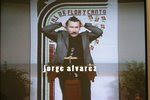Marina Tristán, Assistant Director of Arte Público, forwarded the catalog copy for the new anthology of Latino crime fiction, Hit List. I'll reprint it here with the hope that it whets your interest in this collection.
Edited by Sarah Cortez and Liz Martínez
Introduction by Sarah Cortez
Foreword by Ralph E. Rodríguez, Ph.D.
March 31, 2009, 240 pages, $19.95 ISBN-10: 1-55885-543-2 ISBN-13: 978-1-55885-543-4
This first-ever collection of short mystery fiction by Latino authors contains both stylistically and ethnically diverse stories. In Lucha Corpi’s story, Hollow Point at the Synapses, her unique narrator—a bullet—describes the instant before killing a young Peruvian woman: I feel the pull of the hammer. The pressure mounts. I am now in place. The moment is upon me. Swiftly and efficiently, I will do what I must, what I was created for. In an instant, I am off, traveling at a speed reserved only for death.
This groundbreaking anthology of short fiction by Latino mystery writers, Hit List: The Best of Latino Mystery, features an intriguing and unpredictable cast of sleuths, murderers and crime victims. Reflecting the authors’—and society’s—preoccupation with identity, self, and territory, the stories run the gamut of the mystery genre, from traditional to noir, from the private investigator to the police procedural, and even a chick lit mystery.
The Right Profile features a Miami private investigator who goes undercover to prove a deadbeat father can pay child support, and she delights in testifying against him in court. In The Skull of Pancho Villa, someone has stolen the family heirloom and it’s up to Gus Corral to get it back. And in A New York Chicano, a successful bachelor from El Paso—a graduate of NYU working for Merrill Lynch in Manhattan—gets his revenge against a xenophobic newscaster.
Hit List collects for the first time short fiction by many of the Latino authors who have been pioneers in the mystery genre, using it to showcase their unique cultures, neighborhoods and realities. Contributors include award-winning writers such as Carolina García-Aguilera, Alicia Gaspar de Alba, Rolando Hinojosa, Manuel Ramos and Sergio Troncoso, as well as emerging writers who deserve more recognition.
Sarah Cortez is a poet, educator, and law enforcement officer. She is the author of a poetry collection, How to Undress a Cop (Arte Público Press, 2000), which won the PEN Texas Literary Award in Poetry, and she edited Windows into My World: Latino Youth Write Their Lives (Piñata Books, 2007), winner of a 2008 Skipping Stones Honor Award. She lives and works in Houston, Texas.
Liz Martínez a New York State investigator, has published short stories in numerous anthologies and magazines, including Manhattan Noir (Akashic Books, 2006) and Police Officer’s Quarterly. She lives and works in New York City.
RECENT LITERARY AWARDS FROM SPAIN HONOR CRIME FICTION WRITERS
Margaret Atwood, the popular and prolific Canadian writer who won the 2000 Hammett Prize for The Blind Assassin, will receive Spain’s prestigious Prince of Asturias prize for literature. The prize carries a $66,000 cash award.
Fernando Savater, Spanish author, philosopher and political activist, was named the winner of the Premio Planeta, Spain's most lucrative literary prize, for La Hermandad de la Buena Suerte (The Brotherhood of Good Luck), a detective novel about a missing jockey. The prize carries a cash award of $820,000.
WORDS TO STIR THE SOUL - IMMIGRATION
November 12th, 2008 7:00pm in Old Main, University of Colorado, Boulder Campus
The Center of the American West presents its annual Words to Stir the Soul program. The Center's announcement says: On the heels of one of the longest presidential campaigns in history, one that has turned up the heat on this topic, the Center will shift the focus back from positions to people. This special evening will celebrate the literature of immigration, rather than the policies of immigration. Come listen as community members, politicians, public servants, professors, and a host of others read selections from a literature that has played a crucial role in the formation of the narrative of the West.
I'll be reading at this event but I haven't yet picked my selection. There are many good ones to choose from; for example: Reyna Grande's Across A Hundred Mountains, Luis Alberto Urrea's The Devil's Highway, Victor Villaseñor's Rain of Gold - any other suggestions?
LA BLOGA POLITICA
WHAT TO READ ON ELECTION NIGHTI won't make a percentage-of-the-vote prediction; the numbers are all up for grabs, in my opinion. Landslide? Too close for comfort? I do expect Barack Obama to win but I think it will be tight and that Tuesday night will be a very long night. I won't mind, though, if the Republicans win only Alaska and Arizona and the Presidency is settled by 9:00 pm. However, in anticipation that most of us will be up long past our usual bedtimes, here are some diverse suggestions for reading material as you watch the returns. Keeping everything in context, these novels should satisfy any remaining political appetite you may have after almost two years of campaigning and several hours of watching which states end up red or blue.
All The King's Men - Robert Penn Warren
The Manchurian Candidate - Richard Condon
1984 - George Orwell
Animal Farm - George Orwell
Brave New World - Aldous Huxley
Fahrenheit 451 - Ray Bradbury
Catch-22 - Joseph Heller
Lord of the Flies - William Golding
The Milagro Beanfield War - John Nichols
One Day in the Life of Ivan Denisovich - Alexander Solzhenitsyn
Click on the screen and get ready to dance.
Later.





































